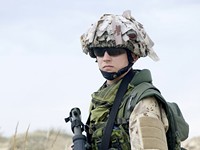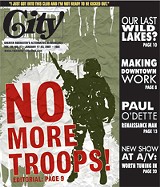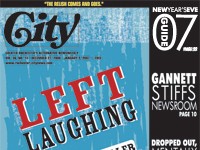[
{
"name": "500x250 Ad",
"insertPoint": "5",
"component": "15667920",
"parentWrapperClass": "",
"requiredCountToDisplay": "1"
}
]
And so we are going to send more Americans to die in Iraq, escalating a disastrous, ill-conceived war.
Ignoring the advice of generals, ignoring the advice of allies, President Bush is preparing to send 21,500 more troops into the cauldron that Iraq has become.
This is not even the escalation that the neocon warriors have clamored for. In his ramp-up address last week, the president said that we have failed in Iraq so far "for two principal reasons: There were not enough Iraqi and American troops to secure neighborhoods that had been cleared of terrorists and insurgents. And there were too many restrictions on the troops we did have."
The neocons who have been urging more troops have recommended 50,000 or more. A slow phase-in of 20,000 or so has been considered too small. But now Senator John McCain and others seem satisfied with the 20,000.
The reason, of course, is that we don't have enough troops for a major escalation.
And so we will escalate this war with the troops we have, in a country that we know little about and whose citizens do not want us there.
The president continues to talk about "our enemies in Iraq." But most of those "enemies" are Iraqis. Even some Republicans who have previously supported the president are worried. Virginia's John Warner told the New York Times after the Bush speech: "I'm particularly concerned about the greater injection of our troops into the middle of sectarian violence. Whom do you shoot at, the Sunni or the Shia?"
We will be propping up a government that increasingly appears to be a big part of the problem: Prime Minister Nuri Kamal al-Maliki has not been willing (or able) to bring Shiite militias under control. "In earlier operations," the president said, "political and sectarian interference prevented Iraqi and American forces from going into neighborhoods that are home to those fueling the sectarian violence." Now, the president says, we have Maliki's pledge: things will be different.
And yet the night before the Bush speech, New York Times reporter John Burns, stationed in Baghdad, gave this assessment on the NewsHour: "Mr. Maliki did not want more American troops. He wanted American troops pulled out of Baghdad to the periphery of the city. He wanted his troops to control the city. He doesn't like much the idea of more American troops embedding, as transition teams or advisers, if you will, with Iraqi military units."
Writing in the Times on January 10, Burns and Sabrina Tavernise said that the Shiite-dominated Iraqi government is worried that "the power they won at the polls, after centuries of subjugation by the Sunni majority, will be progressively whittled away as the Americans seek deals with the Sunnis that will help bring American troops home."
And, worse, Burns' January 11 Times story carried this headline: "US and Iraqis Are Wrangling Over War Plans." The Bush plan to secure Baghdad, wrote Burns, "faces some of its fiercest resistance from the very people it depends on for success: Iraqi government officials."
Burns cited disagreements between Iraqis and American planners over such things as who will be in command and how US troops will be protected. The problems are so serious, wrote Burns, that some of the Americans in Iraq are afraid they "could hobble the effort before it begins."
"We are implementing a strategy to embolden a government that is actually part of the problem," one military official told Burns. "We are being played like a pawn."
"For a gray-haired journalist whose career included 18 months covering the Vietnam
War for the Washington Post," wrote Robert Kaiser in Sunday's Post, "it is a source of amazement to realize that my country has done this again. We twice took a huge risk in the hope that we could predict and dominate events in a nation whose history we did not know, whose language few of us spoke, whose rivalries we didn't understand, whose expectations for life, politics and economics were all foreign to many Americans."
"Both times," wrote Kaiser, "we put our fate in the hands of local politicians who would not follow US orders, who did not see their country's fate the way we did, and who could not muster the support of enough of their countrymen to produce the outcome Washington wanted. In Vietnam as in Iraq, US military power alone proved unable to achieve the desired political objectives."
This is not a new course.
And these are not new people planning the course. The same people who pushed us into war --- ignoring dissenting advice, shaping the facts to fit their ideology --- are the people planning the escalation (and ignoring the dissenting advice and shaping the facts to fit their ideology).
Our allies see that. Even British leaders were not soothed by the Bush speech. The British government is sticking to its plan to withdraw its troops.
We are going to gamble that a policy that has failed disastrously over the past four years will work now, if we simply continue it for a bit longer. And we are gambling with the lives and blood of Americans and Iraqis.
We are increasingly alone in this fight. And most alone of all are the men and women America has sent to Iraq, and the Iraqi people who are helpless as their tragedy grows.
Speaking of...
-

Rocking the cradle in Syria
Apr 29, 2013 -

Petraeus scandal may pull covers off the effects of war
Nov 14, 2012 -
Awaiting the surge
Jan 10, 2007 - More »
Latest in Featured story
More by Mary Anna Towler
-

Police reform: advocates on what should come next
Oct 22, 2019 -

Court clears the way for Police Accountability referendum
Oct 17, 2019 -

Dade outlines initial actions on district deficit
Oct 9, 2019 - More »






